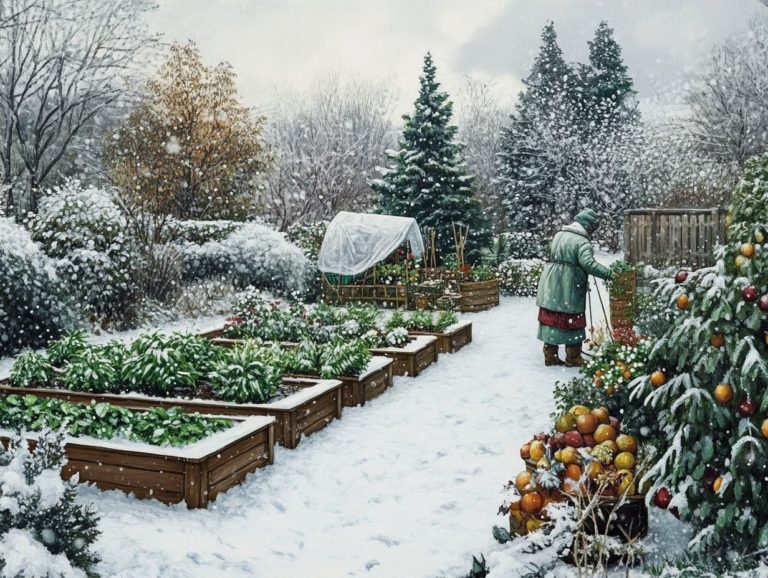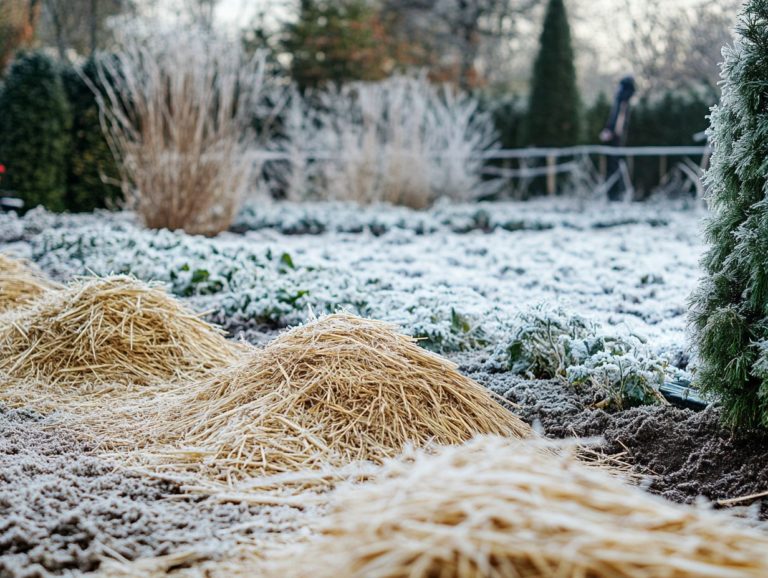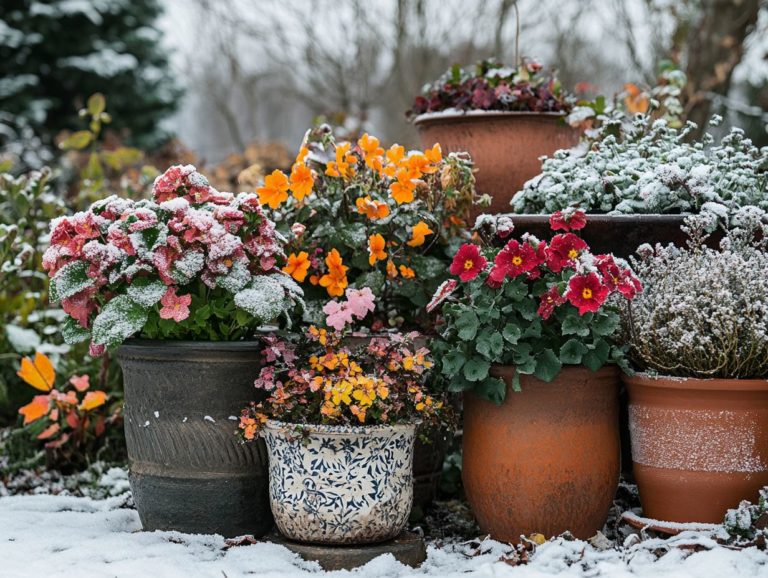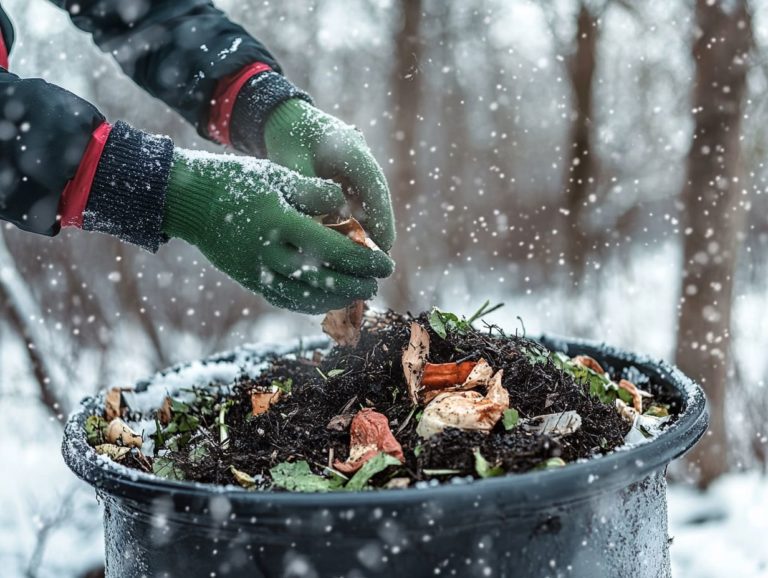What Vegetables Can Be Overwintered?
Overwintering vegetables is an exceptional gardening strategy that enables you to savor fresh produce even during the colder months, particularly in your vegetable garden.
You might wonder what this process entails and why it s worth considering.
This article delves into the best vegetables suited for overwintering, such as kale, spinach, and Brussels sprouts. It guides you on how to prepare your garden for this venture and explores various methods to ensure your plants thrive amidst the winter chill.
With expert tips at your disposal, you can achieve remarkable results! Get ready to extend your growing season!
Contents
Key Takeaways:
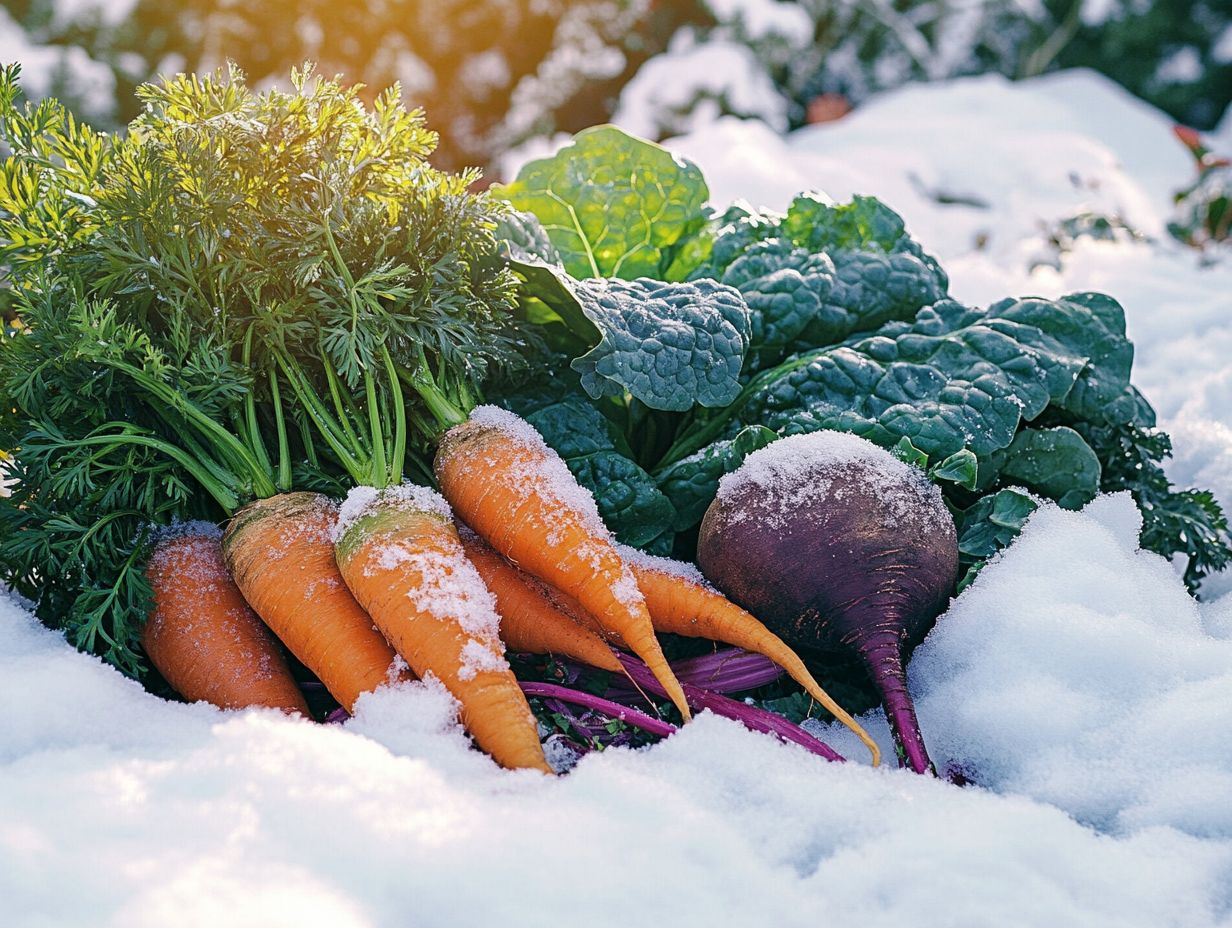
- Overwintering is the process of keeping vegetables alive and thriving through the winter months by protecting them from harsh weather conditions, ensuring good soil health, and optimal pest control.
- Some of the best vegetables for overwintering are kale, spinach, and carrots, as they can survive in cold temperatures and continue to grow slowly, helping improve your food sustainability efforts.
- To prepare your garden for overwintering, clean up debris and add mulch or protective covers such as cold frames or greenhouse covers to help insulate and protect your plants.
Understanding Overwintering Vegetables
Understanding overwintering vegetables is essential for any gardener keen on maximizing yields and ensuring the resilience of their crops. This refined gardening technique involves planting specific hardy vegetables that can survive the cold during the fall, enabling them to flourish throughout the winter months.
By meticulously selecting winter crops and employing appropriate plant protection methods, you can look forward to a bountiful spring harvest. This practice also enhances soil health and promotes sustainability in your vegetable garden.
Adapting to your local climate and grasping the challenges posed by winter weather are crucial elements in mastering successful overwintering.
What is Overwintering and Why Do It?
Overwintering is the practice of cultivating specific vegetable varieties throughout the winter months, giving you a head start when spring arrives.
This technique enables you to enjoy early harvests while significantly contributing to sustainable gardening practices. By choosing hardy varieties that can endure cold temperatures, you can effectively reduce pest damage while enhancing soil health.
Overwintering helps decrease your dependence on chemical pest control, as many pests either die off or enter dormancy during the winter months.
It also promotes careful crop selection, allowing for planting different crops together that help each other grow. Embracing this method gives you the power to create a more resilient and productive growing environment.
Best Vegetables for Overwintering
Selecting the right vegetables for overwintering is essential to guarantee a fruitful harvest in the spring. Include crops like garlic, kale, Brussels sprouts, arugula, and fava beans these resilient choices thrive even in frost and challenging winter conditions.
By adding these winter crops to your vegetable garden, you not only elevate your food sustainability efforts but also indulge in fresh produce during those early months of the year.
Vegetables That Thrive in Cold Temperatures
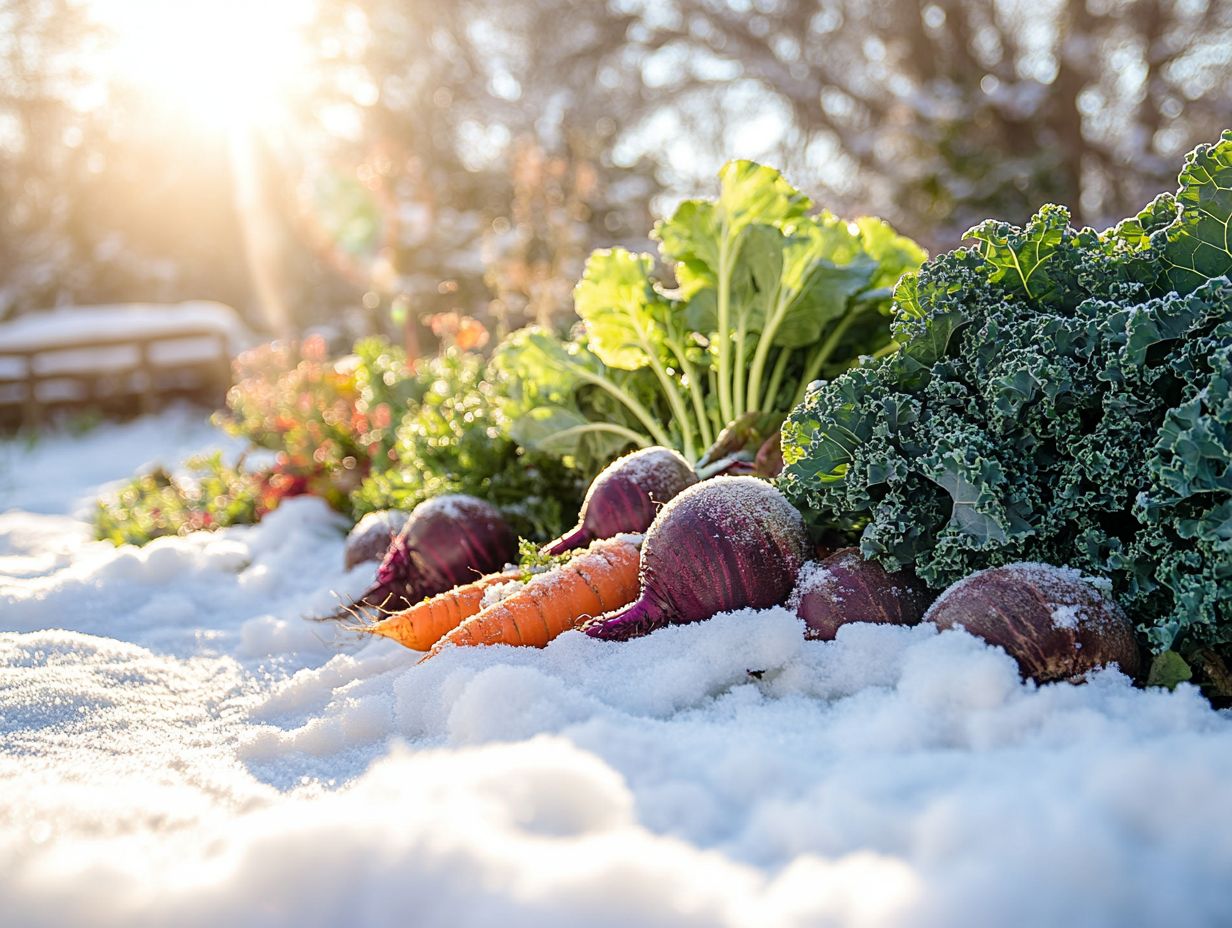
Certain vegetables are exceptionally suited for winter gardening. They thrive in the chill of the season and are excellent candidates for growing through the winter.
Take spinach, for instance. Its vibrant green leaves can brave the frost while delivering a rich supply of vitamins that elevate any meal.
Then there s Claytonia, often known as miner s lettuce. It grows in a charming rosette. Its delicate flavor makes it a delightful addition to your winter salads.
Mustard greens add a peppery zest that enlivens dishes. They mature quickly in cooler climates, offering a speedy harvest.
Let s not forget winter carrots. Their roots sweeten remarkably as they face frost, making this season perfect for reaching their full flavor potential.
Each of these resilient vegetables enhances your winter garden, offering both nutritional benefits and a range of culinary possibilities to explore.
How to Prepare Your Garden for Overwintering
Preparing your garden for overwintering entails several essential steps to significantly boost the success of your crops during the chilly months ahead.
- Improve the soil: Start with soil amendments and the addition of compost. These practices enhance soil health and supply vital nutrients.
- Protect your plants: Implement effective plant protection techniques to safeguard your winter crops from frost and harsh weather. This ensures they thrive until the rejuvenation of spring growth.
Steps for Preparing Your Garden
Preparing your garden for overwintering involves a few key steps: assessing soil health, adding compost, and ensuring proper pest control for your winter crops.
Start with a thorough evaluation of your soil, checking its pH levels and nutrient content. Healthy soil lays the groundwork for robust plants, especially during the colder months.
Next, incorporate high-quality compost. This enriches the soil, enhances its structure, and improves moisture retention.
Don t forget about pest control! It s crucial to protect any emerging winter crops from potential threats. Consider using organic barriers or introducing beneficial insects to maintain a balanced ecosystem.
Methods for Overwintering Vegetables
Utilizing effective methods for overwintering vegetables can greatly elevate your gardening success. These methods enable your crops to flourish in harsh winter conditions.
Techniques like cold frames and greenhouse covers offer crucial frost protection, creating a more controlled environment for growth. They align with organic gardening practices and help you grow more food while maintaining soil health over time.
Different Techniques for Success
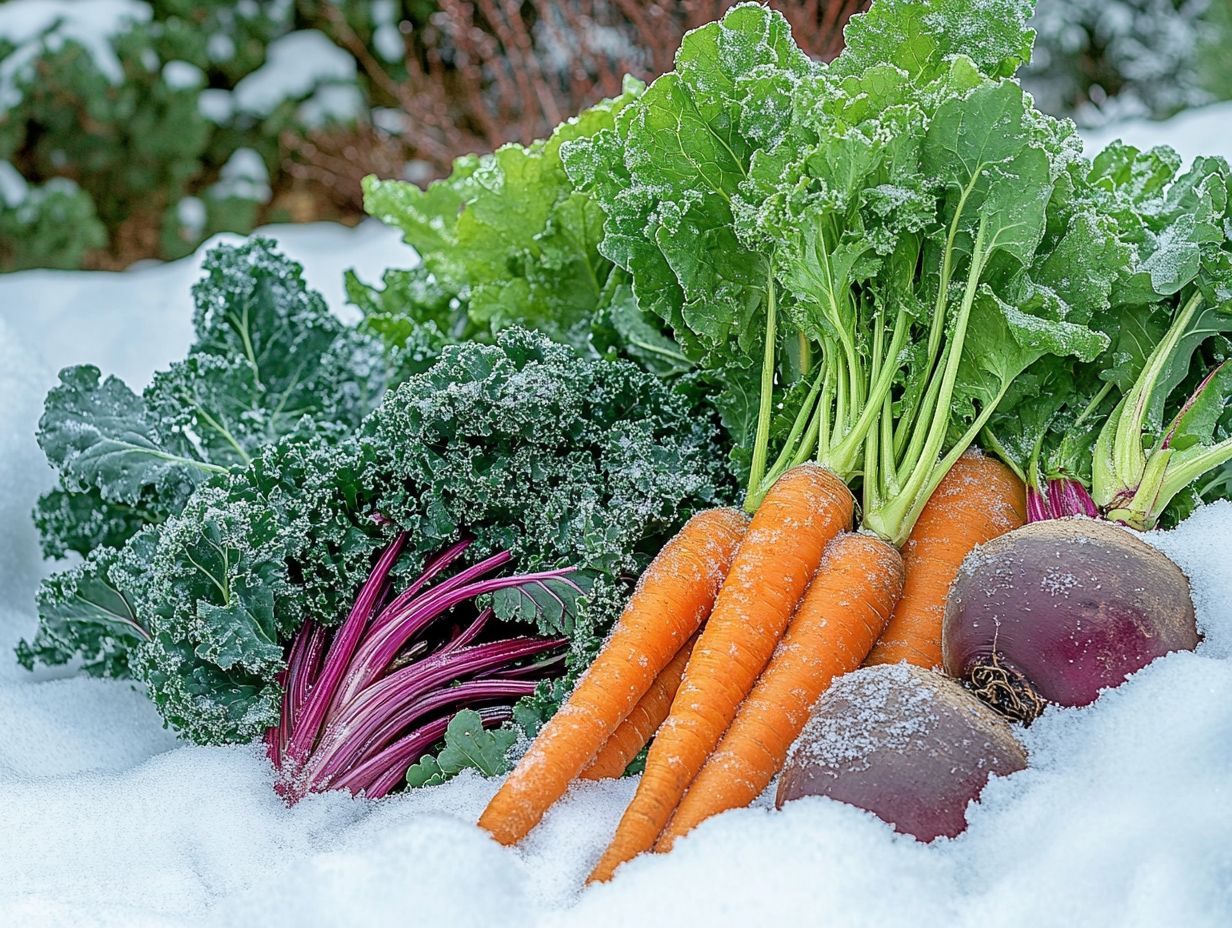
Exploring various techniques for overwintering vegetables, such as garlic planting or winter carrots, can significantly enhance your gardening success. Cold frames and greenhouse covers provide superior frost protection.
These methods trap valuable heat, keeping your crops cozy and creating a stable microclimate. Cold frames function as mini-greenhouses and can be easily constructed from simple materials. Position them strategically to maximize sunlight exposure.
Greenhouse covers made from UV-resistant cloth or film offer a robust barrier against wind and snow, effectively safeguarding your more vulnerable plants. Adding mulch or straw further insulates the soil, helping maintain moisture levels and regulate temperature. This ensures that your overwintering crops remain vibrant and healthy throughout the winter months.
Tips for Successful Overwintering
To achieve successful overwintering results, consider strategies that enhance crop resilience and improve your winter gardening practices.
By implementing key pest control measures, ensuring proper plant protection, and selecting the right vegetable varieties, you can significantly enhance your ability to preserve crops throughout the winter and foster healthy growth in spring.
Expert Advice for Optimal Results
For optimal results in overwintering vegetables, pay close attention to pest control and choose suitable crops for winter planting.
Consider selecting varieties that thrive in cooler temperatures, such as kale, Brussels sprouts, and certain root vegetables. An effective way to keep bugs away is vital to prevent infestations that could jeopardize your plants during their dormant phase.
Embracing organic methods, like introducing beneficial insects and applying horticultural oils, can greatly increase your chances of successful overwintering. Mulching around your plants offers insulation and moisture retention, creating a stable environment for them to thrive.
By following these expert recommendations, you can lay the groundwork for a vibrant spring harvest.
Frequently Asked Questions
What Vegetables Can Be Overwintered?
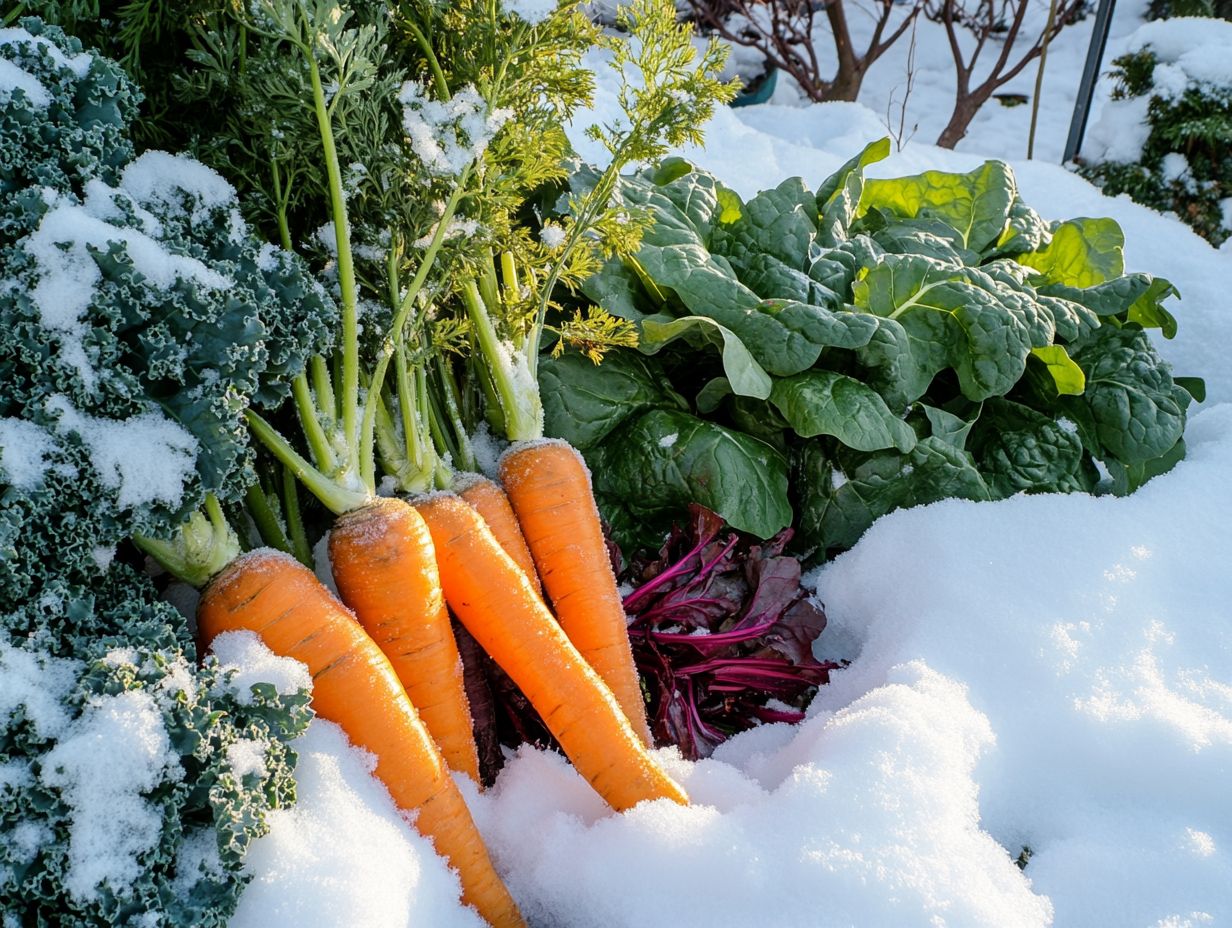
Vegetables that can be overwintered include hardy greens such as kale, collard greens, spinach, and other cold-hardy crops.
Can Root Vegetables Be Overwintered?
Yes, root vegetables like carrots, parsnips, and turnips can be overwintered if properly prepared and stored to ensure their flavors are preserved for spring meals.
How Do I Prepare My Vegetables for Overwintering?
To prepare your vegetables for overwintering, ensure they are mature, healthy, and free from damage. Carefully dig them up, clean off excess soil, and let them dry thoroughly before storing.
What is the Best Method for Overwintering Vegetables?
The best method for overwintering vegetables is to store them in a cool, dark place with good ventilation, like a root cellar, basement, or garage. Keep the temperature between 32-40 F for optimal results.
Can I Overwinter Vegetables Outdoors?
Yes, some vegetables can be overwintered outdoors, but they may require extra protection from freezing temperatures. Use mulch or cover them with a layer of straw or leaves to help insulate and prevent damage.
What Happens if I Don’t Overwinter My Vegetables?
If you don’t overwinter your vegetables, they will likely die or become inedible due to harsh winter conditions. Overwintering extends your growing season, allowing you to enjoy fresh, homegrown vegetables during colder months.
Start preparing your garden today for a successful spring harvest!

